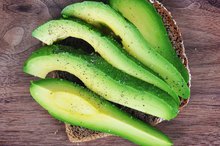Are Special K Cereal Bars Healthy?
When it comes to manufactured foods, healthy is a relative term. Special K cereal bars have some qualities that you may consider healthy and some that you may not. Special K produces a line of foods that are designed to be low in calories, but that does not always mean high in nutrients.
Calories
The best thing about Special K cereal bars is that they only have 90 calories. They are a low-calorie breakfast replacement that can also be consumed as a snack. The average adult should consume about 2,000 calories per day, so a Special K snack bar fulfills about 5 percent of your daily energy needs. If you are consuming fewer calories as part of a weight-loss plan, this percentage will be higher.
- The best thing about Special K cereal bars is that they only have 90 calories.
- The average adult should consume about 2,000 calories per day, so a Special K snack bar fulfills about 5 percent of your daily energy needs.
Macronutrients
Kellogg's Special K Ingredients
Learn More
Special K cereal bars have about 1.5 g of fat, less than 1 g of protein, and 18 g of carbohydrate, including 3 g of fiber and 8 g of sugar. Of the 1.5 g of fat, 1 g is saturated fat, which is the type of fat that is associated with heart disease, but it is in a small amount. There is not much protein in this product so be sure to consume more protein at other meals throughout the day. No food is perfect. These nutrition facts are acceptable for someone attempting to lose weight or stay trim.
- Special K cereal bars have about 1.5 g of fat, less than 1 g of protein, and 18 g of carbohydrate, including 3 g of fiber and 8 g of sugar.
- Of the 1.5 g of fat, 1 g is saturated fat, which is the type of fat that is associated with heart disease, but it is in a small amount.
Micronutrients
According to the nutrition facts label on the package, Special K cereal bars do not provide more than 10 percent of any micronutrient. For many vitamins and minerals, it provides none of the dietary reference intake 1. For example, vitamin A, vitamin C, calcium and iron are all lacking completely however several B vitamins are present in the amount of 10 percent of the DRI.
Processing
Difference Between Luna Bars & Clif Bars
Learn More
Special K cereal bars are a highly processed food with a long shelf life and many chemicals and preservatives. The benefits to this are that they will not waste or spoil easily, but on the downside, there are many potential health concerns associated with heavy consumption of chemicals and preservatives, though there is no conclusive study on long-term effects as many of these food technologies are new. Consume in moderation.
Related Articles
References
- Mattes RD. Ready-to-eat cereal used as a meal replacement promotes weight loss in humans. J Am Coll Nutr. 2002;21(6):570-7. doi:10.1080/07315724.2002.10719257
- Kellogg's. Jeans don't lie. Updated September 2007.
- Food and Nutrition Service. Dietary Guidelines for Americans. United States Department of Agriculture (USDA). Updated December 19, 2018.
- Special K Red Berries Cereal. FoodData Central. U.S. Department of Agriculture. Published April 1, 2019.
- Rebello CJ, Johnson WD, Martin CK, et al. Instant oatmeal increases satiety and reduces energy intake compared to a ready-to-eat oat-based breakfast cereal: A randomized crossover trial. J Am Coll Nutr. 2016;35(1):41-9. doi:10.1080/07315724.2015.1032442
- Gianturco P, Perez V. A meta-analysis of intervention trials examining the effects of a simple 2-week weight loss program on body weight and waist circumference. J Nutrition Health Food Sci. 2016;4(1):1-9. doi:10.15226/jnhfs.2016.00154
- Shaw P, Walton J, Jakeman P. The effects of the Special K challenge on body composition and biomarkers of metabolic health in healthy adults. J Nutr Health Sci. 2015;2(4):403. doi:10.15744/2393-9060.2.403
- Vander Wal JS, McBurney MI, Cho S, Dhurandhar NV. Ready-to-eat cereal products as meal replacements for weight loss. Int J Food Sci Nutr. 2007;58(5):331-40. doi:10.1080/09637480701240802
Writer Bio
Elizabeth Donahue is a clinical dietitian in a pediatric special-needs clinic. She is a registered dietitian with the American Dietetic Association, a licensed nutritionist with the State of Florida and has been certified as a breastfeeding specialist by Lactation Education Resources. Donahue holds a Bachelor of Science in dietetics and nutrition from Florida International University.









